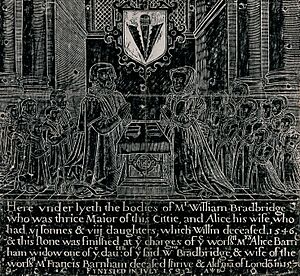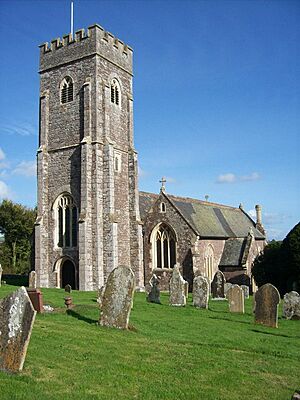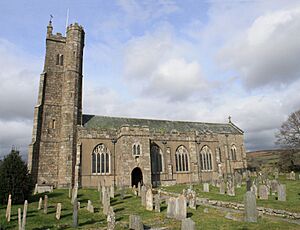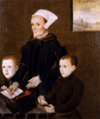Nicholas Marston facts for kids
Nicholas Marston was an English priest who lived in the 16th and early 17th centuries. He was one of three brothers who all had careers in the church, especially in the Diocese of Exeter in Cornwall and Devon. Their father was a rich merchant in London who helped his wife's brother, William Bradbridge, become a bishop. The Marston family had strong connections with important church leaders and the University of Oxford for many years.
Contents
Nicholas Marston's Early Life and Education
Nicholas Marston was the second son of Thomas Marston, a wealthy London merchant. His mother was Sybill, who was the sister of William Bradbridge, who later became the Bishop of Exeter. This family connection was very important for the Marston brothers' careers in the church.
Thomas Marston was a successful businessman who owned property in London. He was also involved in important city duties, like helping prepare the route for Queen Elizabeth I of England's coronation. His connections with powerful people, including his brother-in-law William Bradbridge, helped his sons get good positions in the church.
Nicholas Marston went to Christ Church, Oxford, a famous university. He earned his first degree (Bachelor of Arts) in 1565 and his Master of Arts degree in 1567.
The Marston Brothers' Church Careers
Nicholas had two brothers, William and Vincent, who also became priests.
William Marston's Career
William Marston, the elder brother, started his church career early. At just 16, he became the rector of Shobrooke, Devon, in 1560. When his uncle, William Bradbridge, became Bishop of Exeter in 1571, William Marston received several important church roles. He became a prebendary (a type of senior priest) at Exeter Cathedral, and also the rector of Bridestowe. Later that year, he was appointed the precentor of Exeter Cathedral, a role that involved leading the choir and services.
Nicholas Marston's Appointments
Nicholas Marston also received many church appointments under his uncle Bishop Bradbridge. In 1571, he became the vicar of St Gluvias and a prebendary of Exeter Cathedral. He also became the rector of Clayhidon. In 1572, he became a residentiary canon at Exeter Cathedral, which meant he had to live there, so he left his role at St Gluvias.
In 1574, Nicholas was installed as the Archdeacon of Cornwall. However, it's not clear if this appointment fully took effect because another person already held that position. Nicholas tried to get a higher degree in divinity (Bachelor of Divinity) at Oxford, but he wasn't admitted.
In 1581, Nicholas became the rector of Moretonhampstead, Devon. He held this position for a very long time, 43 years, until his death.
Vincent Marston's Path
Vincent Marston, the youngest brother, also studied at Oxford. He became a deacon and then a priest in 1572. He served as a chaplain at Exeter College, Oxford and later became the rector of Lezant, Cornwall. Vincent passed away in late 1583.
Family Connections and Later Life
The Marston family had strong ties to other important London merchant families. Nicholas and William's sisters married wealthy and influential merchants. For example, their sister Anne married Peter Robinson, and Alice married John Johnson, who became a leader of the Merchant Taylors' Company. Another sister, Elizabeth, married Sir Cuthbert Buckle, who became the Lord Mayor of London. These marriages created a powerful network of family connections that helped the Marstons in their careers.
William Marston, the precentor, also became a prebendary at Wells Cathedral in 1589. He died in 1599, and Nicholas was named as his executor.
Nicholas Marston married a woman named Susan, and they had a daughter named Sibilla. Nicholas continued to serve in the church, holding the rectory of Moretonhampstead and the vicarage of St Marychurch until his death on May 14, 1624.
Images for kids







